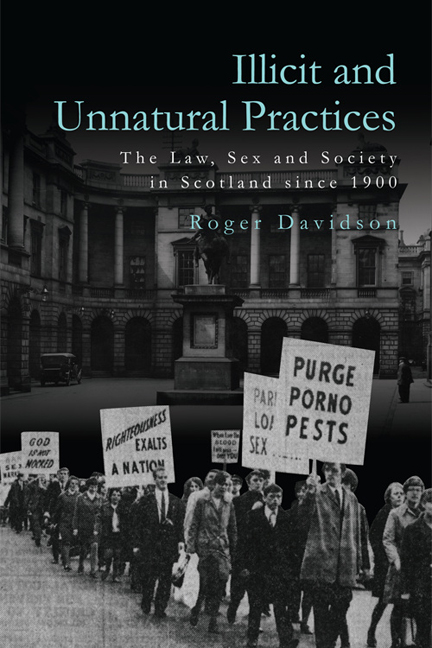Book contents
- Frontmatter
- Contents
- List of Figures and Tables
- Acknowledgements
- List of Abbreviations
- 1 Introduction
- 2 ‘Venereal Trouble’: The Case of ‘Professor’ Abraham Eastburn
- 3 ‘This Pernicious Delusion’: Law, Medicine and Child Sexual Abuse
- 4 ‘Unnatural Carnal Connection’: Bestiality and the Law in Early Twentieth-century Scotland
- 5 ‘There’s the Man who Shifts the Babies’: Abortion in the Scottish High Court, 1900−30
- 6 ‘An Open and Notorious House of Lewdness’: Dora Noyce and the Danube Street Brothel
- 7 Cure or Confinement? Law, Medicine and the Treatment of Homosexual Offenders in Scotland, 1950−80
- 8 ‘Liable or Likely to Deprave and Corrupt the Morals of the Lieges’: Sex Shops and Moral Panic in Late Twentiethcentury Scotland
- 9 ‘Culpable and Reckless Conduct’: Criminalising the Transmission of HIV in Scotland, 1983−2014
- 10 Conclusion
- Sources and Select Bibliography
- Index
6 - ‘An Open and Notorious House of Lewdness’: Dora Noyce and the Danube Street Brothel
Published online by Cambridge University Press: 23 April 2021
- Frontmatter
- Contents
- List of Figures and Tables
- Acknowledgements
- List of Abbreviations
- 1 Introduction
- 2 ‘Venereal Trouble’: The Case of ‘Professor’ Abraham Eastburn
- 3 ‘This Pernicious Delusion’: Law, Medicine and Child Sexual Abuse
- 4 ‘Unnatural Carnal Connection’: Bestiality and the Law in Early Twentieth-century Scotland
- 5 ‘There’s the Man who Shifts the Babies’: Abortion in the Scottish High Court, 1900−30
- 6 ‘An Open and Notorious House of Lewdness’: Dora Noyce and the Danube Street Brothel
- 7 Cure or Confinement? Law, Medicine and the Treatment of Homosexual Offenders in Scotland, 1950−80
- 8 ‘Liable or Likely to Deprave and Corrupt the Morals of the Lieges’: Sex Shops and Moral Panic in Late Twentiethcentury Scotland
- 9 ‘Culpable and Reckless Conduct’: Criminalising the Transmission of HIV in Scotland, 1983−2014
- 10 Conclusion
- Sources and Select Bibliography
- Index
Summary
INTRODUCTION
On 22 September 1973, Dora Noyce (seventy-three), described in the press as ‘the oldest girl in the oldest profession’, was fined the considerable sum of £250 in Edinburgh Sheriff Court under section 13 of the Criminal Law Amendment Act 1885, for keeping a brothel at 17 Danube Street. She admitted twenty-eight previous convictions, dating back to 1934. Over the years, after ‘bouts of police surveillance’, Dora Noyce had been regularly fined for her activities and, at intervals, sentenced to periods of imprisonment. On this occasion, given that she had only recently completed a four-month prison sentence, the sheriff accepted the view of defence counsel that she was ‘incorrigible’ and ‘unrepentant’ and that a fine to render her activities ‘less profitable’ would be the most appropriate punishment and least burdensome to the taxpayer.
As was customary after her court appearances, Noyce, by then a great grandmother, conducted an impromptu press conference in Deacon Brodie's immediately after she had been discharged, ensuring that her business received widespread publicity. She remained undaunted by the prospect of further police raids on her establishment followed by further criminal convictions and ever-increasing fines. She told reporters, ‘in an impeccable Edinburgh voice’, that she had ‘been intermittently in the business for thirty years’ and had ‘no intention of closing down’. She was proud of building up an establishment of ‘national and international repute’. According to Noyce, she provided ‘a service in a clean and honest house’ that was ‘really rather a refined affair’. She likened her ‘house of leisure and pleasure’ − she hated the term ‘brothel’ − to the YMCA, ‘except for one little item’, arguing that it provided a ‘discreet’ and ‘homely’, rather than predatory, environment in a city that was starved of entertainment after 10 p.m.
Dora Noyce and her Danube Street brothel played a central role in the sexual folklore of late twentieth-century Scotland. This chapter seeks to explore the true story behind her career as a madam, the operation of the brothel, and the nature of the social and legal response to her enterprise in the post-war years.
- Type
- Chapter
- Information
- Illicit and Unnatural PracticesThe Law, Sex and Society in Scotland since 1900, pp. 114 - 128Publisher: Edinburgh University PressPrint publication year: 2018



